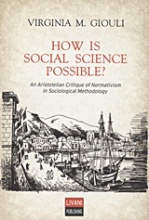How is Social Science Possible?
An Aristotelian Critique of Normativism in Sociological Methodology
Highly complex issues on sociological methodology are tackled in this monograph. In Aristotle significances and viewpoints are activated by the corresponding mental images. The sort of realism in such mental states implies that Aristotle's essentialism is declining. Talking about minds certainly is not talking about matter. There is a stern warning in Aristotle to avoid matter reductionism. But this is not necessarily true the other way round. Aristotle defends empiricism. A line of demarcation is accurately stressed by Giouli in her monograph regarding what we can explain and what we cannot explain. And there exists no explanation for any causal relation between the faculty of nous and what really is politically and socially out there. To claim that there exists any necessary connection would be nonsensical; apart from the specific truths about certain humble everyday judgements which we cannot be critical of. She offers us the tools to extend our thoughts to the socially unknown, realizing Aristotle's idea that human reason is frail, and that human life and its products deprave. Aristotle's critigue of normativism in sociological methodology consists in his advocating an end-stop to explanation, an answer that does not invite a further question. Her methodology focuses on Aristotle's conception of social and political values as ideals that need to be realized; hence her interpretation of Aristotle's decreasing normativism, which is an extreme thesis. After all, Aristotle has asserted that that which politically and socially cannot be otherwise, is not within reach.
- ISBN978-960-14-2554-2
- Ημ/νια Έκδοσης2012
- Σελίδες303
- ΔέσιμοΜαλακό εξώφυλλο
- Διαθέσιμες Γλώσσες
- Κατηγορίες Βιβλίου
- Θεματολογίες Βιβλίου
- Συγγραφέας
- Εκδότης







